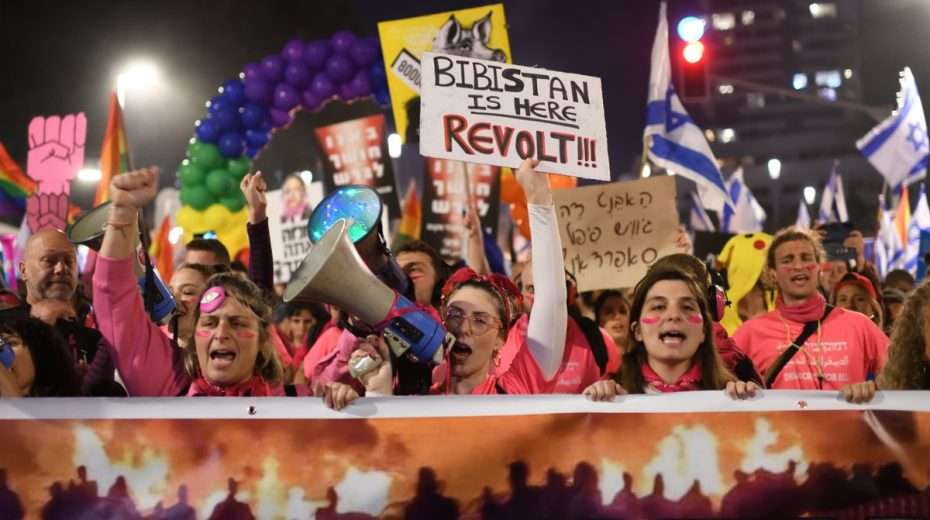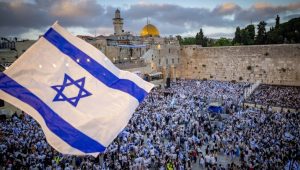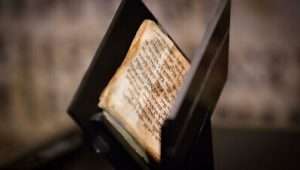With Jews being ingathered from the four corners of the earth, the modern State of Israel had no choice but to become a melting pot for the various cultural, political and ideological backgrounds the returning exiles brought with them.
For a while it worked. At least on the surface.
Israel grew strong, and in times of great crisis everyone came together to defend the Jewish state. After all, despite the differences imposed by two millennia of living in a widely-scattered diaspora, the Jewish people are one.
But true integration, the reforging of a single Israeli identity, was never achieved. And perhaps “reforging” isn’t the right term, for even in kingdoms past the people of Israel were deeply divided.
Those remaining differences are now being highlighted in such visceral terms as to make one wonder whether or not Israelis still see each other as brothers, whether or not they’ll still fight for one another.
The nation’s left-wing opposition and the anti-government protestors are using the most hostile language they can conjure against the likes of Prime Minister Benjamin Netanyahu and National Security Minister Itamar Ben-Gvir.
Do Yair Lapid and the average Tel Aviv protestor following his lead still view Netanyahu and Ben-Gvir as brothers?
Last week a number of IDF reservists suggested they wouldn’t fight in an emergency war if the current government was still in power.
Former Knesset Speaker Avraham Burg made no bones about it when he explained at the weekend to Israeli radio his controversial reaction to the events in and surrounding the Palestinian village of Huwara.
Burg was asked why he had chosen to make a solidarity visit to Huwara after it was stormed by Jewish demonstrators, but not pay a sympathy call to the Jewish family whose sons’ murder had precipitated the unprecedented settler response.
His reply was that Hallel and Yagel Yaniv, the two young Jewish settlers mercilessly gunned down in Huwara, “are not my brothers.”
Burg went on to stress that he “does not have have genetic brothers. I have brothers in terms of ideology,” which explains why he identifies more with Palestinians than with Jews settling the biblical heartland in the conflict between the two.
The problem is that Burg’s point of view reflects that of a great many secular Israelis, who no longer see religious Jews, and certainly not religious Jewish “settlers,” as family. Which is why they view it as entirely legitimate, if not imperative to bring Israel to its knees over the policies of a religious right-wing government, even when that government was elected democratically.
Can this rift be healed? Is there any amount of prayer that will bring the two sides back together as one family? Or is this another means by which God shows us that Israel is strong, prosperous and secure by His might, and not by its own?
















Yeshua asked and answered your question: “Who is my mother and my brothers? He who does the will of my Father in Heaven is My mother, and brother and sister.” So, turning to God and doing His will is the ONLY answer.
In the eighteenth chapter of Revelation, you read about Babylon. It is a form of government that started in the tenth chapter of Genesis, Nimrod was its first leader and it is and has been a form of government throughout the history of the world in some form or other. It has always been a rebellious form, always against the Lord. As you read through the eighteenth chapter of Revelation, keeping in mind all that is going on in the world today, you get a glimpse of who Babylon is in today’s world. ALL, the hatred, all the violence, the rebellion that is being pushed to bring about the agenda of the left, it is all there.
The Lord separated the sheep and the goats a long time ago, Who is acting like whom? and which side are they standing on in today’s world?
It was ever thus with Israel. Throughout history as revealed in the Bible, all Israel moaned and groaned when things went wrong or happened to them that hurt them or worried them, or that they simply didn’t like. In Revelation 1 v 1-8 our dear Lord reminds us all that he will return. Obadiah v 15 leapt from the page to me very recently. Amen come Lord Jesus (Yeshua).